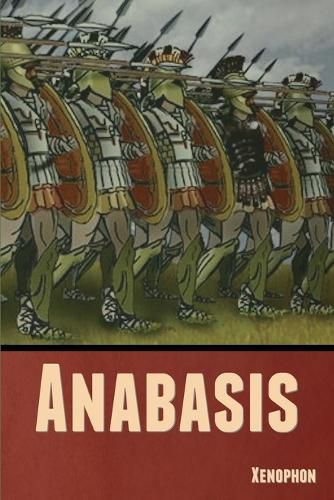Readings Newsletter
Become a Readings Member to make your shopping experience even easier.
Sign in or sign up for free!
You’re not far away from qualifying for FREE standard shipping within Australia
You’ve qualified for FREE standard shipping within Australia
The cart is loading…






This title is printed to order. This book may have been self-published. If so, we cannot guarantee the quality of the content. In the main most books will have gone through the editing process however some may not. We therefore suggest that you be aware of this before ordering this book. If in doubt check either the author or publisher’s details as we are unable to accept any returns unless they are faulty. Please contact us if you have any questions.
Anabasis (an "expedition up from") is the most famous work of the Ancient Greek professional soldier and writer Xenophon. It narrates the expedition of a large army of Greek mercenaries hired by Cyrus the Younger to help him seize the throne of Persia from his brother, Artaxerxes II, in 401 BC.
The seven books making up the Anabasis were composed circa 370 BC. Though as an Ancient Greek vocabulary word, ?????????? means "embarkation", "ascent" or "mounting up", the title Anabasis is rendered in translation as The March Up Country or as The March of the Ten Thousand. The narration of the army's journey across Asia Minor and Mesopotamia is Xenophon's best known work, and "one of the great adventures in human history".
The Greek term anabasis referred to an expedition from a coastline into the interior of a country. While the journey of Cyrus is an anabasis from Ionia on the eastern coast of the Aegean Sea, to the interior of Asia Minor and Mesopotamia, most of Xenophon's narrative is taken up with the return march of Xenophon and the Ten Thousand, from the interior of Babylon to the coast of the Black Sea. Socrates makes a cameo appearance, when Xenophon asks whether he ought to accompany the expedition. The short episode demonstrates the reverence of Socrates for the Oracle of Delphi.
Xenophon's account of the exploit resounded through Greece, where, two generations later, some surmise, it may have inspired Philip of Macedon to believe that a lean and disciplined Hellene army might be relied upon to defeat a Persian army many times its size.
Besides military history, the Anabasis has found use as a tool for the teaching of classical philosophy; the principles of statesmanship and politics exhibited by the army can be seen as exemplifying Socratic philosophy. (wikipedia.org)
$9.00 standard shipping within Australia
FREE standard shipping within Australia for orders over $100.00
Express & International shipping calculated at checkout
This title is printed to order. This book may have been self-published. If so, we cannot guarantee the quality of the content. In the main most books will have gone through the editing process however some may not. We therefore suggest that you be aware of this before ordering this book. If in doubt check either the author or publisher’s details as we are unable to accept any returns unless they are faulty. Please contact us if you have any questions.
Anabasis (an "expedition up from") is the most famous work of the Ancient Greek professional soldier and writer Xenophon. It narrates the expedition of a large army of Greek mercenaries hired by Cyrus the Younger to help him seize the throne of Persia from his brother, Artaxerxes II, in 401 BC.
The seven books making up the Anabasis were composed circa 370 BC. Though as an Ancient Greek vocabulary word, ?????????? means "embarkation", "ascent" or "mounting up", the title Anabasis is rendered in translation as The March Up Country or as The March of the Ten Thousand. The narration of the army's journey across Asia Minor and Mesopotamia is Xenophon's best known work, and "one of the great adventures in human history".
The Greek term anabasis referred to an expedition from a coastline into the interior of a country. While the journey of Cyrus is an anabasis from Ionia on the eastern coast of the Aegean Sea, to the interior of Asia Minor and Mesopotamia, most of Xenophon's narrative is taken up with the return march of Xenophon and the Ten Thousand, from the interior of Babylon to the coast of the Black Sea. Socrates makes a cameo appearance, when Xenophon asks whether he ought to accompany the expedition. The short episode demonstrates the reverence of Socrates for the Oracle of Delphi.
Xenophon's account of the exploit resounded through Greece, where, two generations later, some surmise, it may have inspired Philip of Macedon to believe that a lean and disciplined Hellene army might be relied upon to defeat a Persian army many times its size.
Besides military history, the Anabasis has found use as a tool for the teaching of classical philosophy; the principles of statesmanship and politics exhibited by the army can be seen as exemplifying Socratic philosophy. (wikipedia.org)